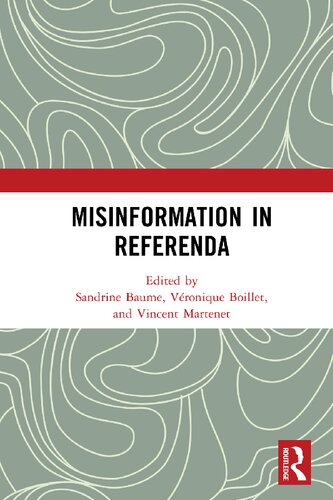

Most ebook files are in PDF format, so you can easily read them using various software such as Foxit Reader or directly on the Google Chrome browser.
Some ebook files are released by publishers in other formats such as .awz, .mobi, .epub, .fb2, etc. You may need to install specific software to read these formats on mobile/PC, such as Calibre.
Please read the tutorial at this link: https://ebookbell.com/faq
We offer FREE conversion to the popular formats you request; however, this may take some time. Therefore, right after payment, please email us, and we will try to provide the service as quickly as possible.
For some exceptional file formats or broken links (if any), please refrain from opening any disputes. Instead, email us first, and we will try to assist within a maximum of 6 hours.
EbookBell Team

4.7
76 reviewsThe book identifies the impact of misinformation in the context of referenda. While the notion of misinformation is at the centre of current events and is the subject of several studies, it has rarely been addressed in the context of referenda or from a multidisciplinary and comparative perspective. This book fills this gap. Different legal orders have been chosen because of their extensive referendum practices (California and Switzerland); a recent legislative process on the issue of misinformation (Germany, France, and Canada); or recent experience with a vote during which it was considered that false information had been disseminated (Brexit, Catalan independence, and Italian constitutional referendum of 2016). By bringing together authors from the political and legal sciences, the book focuses on combining the expertise of researchers from different backgrounds and origins in order to propose innovative solutions. In this regard, the book is characterized by the fact that it does not aim to combat misinformation per se, but develops suggestions meant to guarantee the conditions of formation of the political will during referenda.
The book will be an invaluable resource for legal scholars, political scientists, and specialists of political communication. Outside the world of academia, the book may draw the attention of policy-makers, practitioners, and journalists confronted with the challenges of misinformation or disinformation.